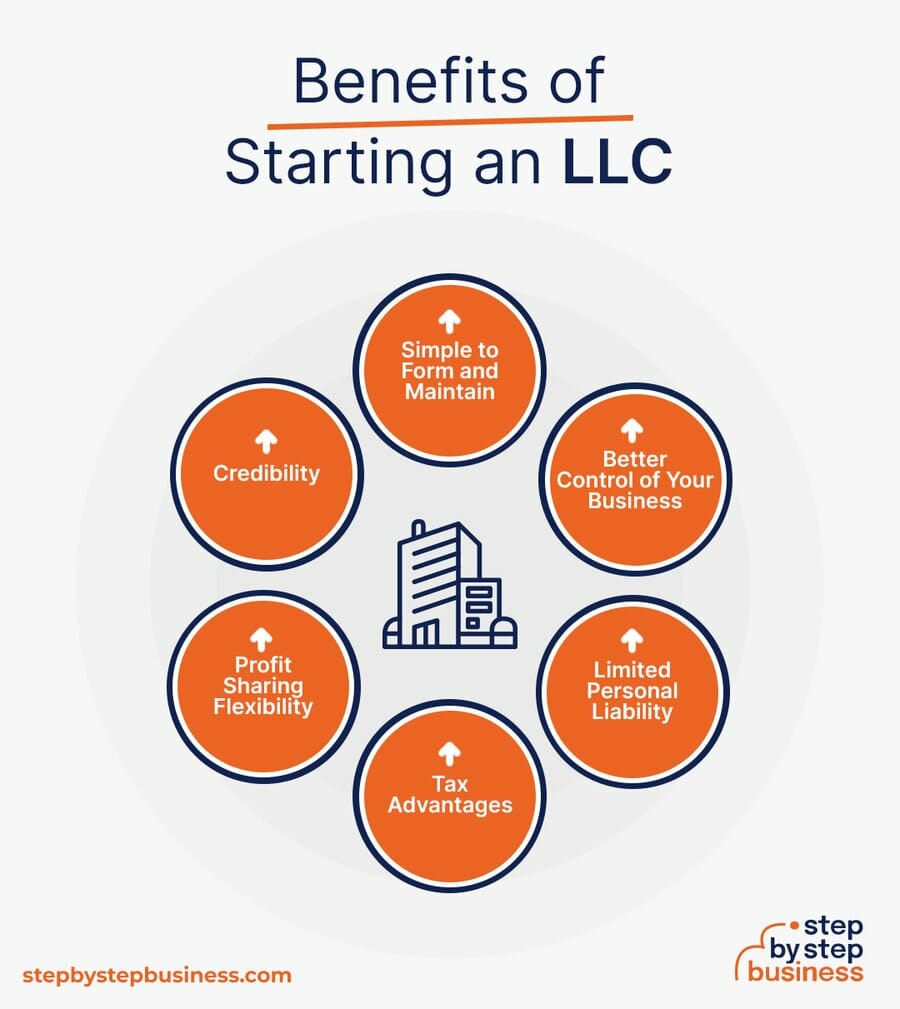If you’re starting an LLC, the business entity formation process is one of the first and most important hurdles. This step can be terribly complex ...
6 Advantages of Forming an LLC
Written by: Carolyn Young
Carolyn Young is a business writer who focuses on entrepreneurial concepts and the business formation. She has over 25 years of experience in business roles, and has authored several entrepreneurship textbooks.
Edited by: David Lepeska
David has been writing and learning about business, finance and globalization for a quarter-century, starting with a small New York consulting firm in the 1990s.
Published on September 28, 2021

When starting a new business, choosing a business entity type is one of the most important decisions you’ll make.
Many startup owners choose to form a limited liability company (LLC), which combines the advantages of a corporation and a partnership, and offers other benefits. This article details the key advantages of an LLC.

1. Simplicity
An LLC is simple to form, requiring much less paperwork than forming a corporation. You only need to file articles of organization with the state, though you should also have an operating agreement to define ownership and roles and responsibilities.

Unlike a corporation, no annual meetings or reporting are required, and you don’t need a board of directors. In some states, however, you do have to file an annual report for an LLC.
It’s also less expensive to form an LLC compared to other legal structures. Corporations and partnerships are best formed with the assistance of an attorney, which can be expensive. It is a good idea, however, to have your LLC’s operating agreement reviewed by an attorney. Corporations also pay fees for their required filings, and annual filing fees.
An LLC also does not need an Employer Identification Number (EIN) unless it has employees.
2. Control
In an LLC, you can be the only owner just like in a sole proprietorship, giving you full control of the business. If you have more than one owner, you can structure the management any way you choose with your operating agreement.

You don’t have to answer to a board of directors or anyone else. You have more freedom to make decisions than you do in another type of business structure, other than a sole proprietorship.
3. Limited Personal Liability
Unlike a sole proprietorship, an LLC is considered a legal entity that is separate from you, the owner. Just as in a corporation, your personal assets are protected because you are not personally liable for the company’s debts or legal liabilities.

In a sole proprietorship or general partnership, your personal assets such as your home are at risk if there are unpaid debts or legal liabilities.
There are some instances in which an LLC owner, however, could have personal risk. For example, if you are asked to personally guarantee a business loan, you are personally liable for the debt.
4. Tax Advantages
An LLC is considered a “pass through” entity, which means income passes through the business to the owners for tax purposes. The LLC is not a taxable entity, so all income is reported on the tax return of the owner or owners and taxed at their personal income tax rate.

This makes it different from a corporation, which is taxed, as are the dividends shareholders receive. This is sometimes referred to as double taxation.
LLC owners also may be eligible for the 20% pass-through deduction that was part of the Tax Cuts and Jobs Act, meaning that they can deduct up to 20% of the business income.
An LLC, however, can choose to be taxed as a corporation or partnership if it is determined to be beneficial to the company.
5. Profit Sharing Flexibility
Most businesses split profits based on the capital contributions of the owners. In a partnership, profits are generally divided equally. Corporations pay dividends based on the ownership percentage of the shareholders.

With an LLC, the owners can specify any profit-sharing plan they choose in the operating agreement. One owner, for instance, could take a share of profits greater than their ownership interest, while other owners take less. This may be done in a case where one owner is more involved in the operations of the business than others.
LLCs may, however, be limited in distributing profits if doing so puts the LLC at risk. If the LLC’s debts are greater than its assets, profits may also not be distributed.
There are some IRS rules that may apply to allocations of profits to owners that are not aligned with their ownership interests. The IRS may require that an economic circumstance be proven to justify a special allocation that gives owners potential tax advantages.
6. Credibility
An LLC has the advantage of having more credibility with customers and vendors than a sole proprietorship. As a matter of perception, people see an LLC more as a real, established company rather than a one-person show.

Conclusion
Forming an LLC is simple and has many benefits, which is why it’s an increasingly popular choice for startups.
Probably the number one reason many choose to form an LLC is the limited personal liability for owners. All businesses are risky, but with an LLC your home and personal money are not at risk. Your personal risk is limited to the capital you contribute to the company.
LLCs are also uncomplicated in many ways, and tax time is much easier for an LLC than a corporation.
Subscribe to Our Newsletter
and gain insider access to cutting-edge business insights and trends.


Comments